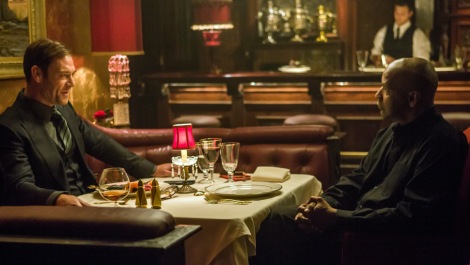The Equalizer

Much has been made of Liam Neeson’s middle-aged transformation into a man of action, but Denzel Washington got there first. A double Oscar winner renowned for heavyweight performances in movies such as Weep Freedom, Glory, Malcolm X, Courage Under Fire and The Hurricane, in 2004, the then-49-year-ancient took a career swerve to hand a bunch of Mexican kidnappers their asses in Tony Scott’s Man On Fire. Déjà Vu and Unstoppable have since kept him ticking, and now he goes boom in The Equalizer.
Washington plays Robert McCall, an introspective but kind-hearted widower who awakens each morning to shave his scalp, drink a fruit smoothie and commute to his job at a DIY superstore. At night he eats his meal, washes his dishes and heads to an all-night diner to sip tea and bury his head in literary classics. Then he witnesses a Russian pimp strike a young prostitute (Chloë Grace Moretz) who’s also a late-night regular at the diner.
Soon after, when she’s hospitalised by a beating, his conscience decries he must do something about it… like kill five Russian criminals with a pair of corkscrews in 28 brutal, choreographed seconds. Only they turn out to be East Coast Mafioso, and oligarch Pushkin (Vladimir Kulich) sends in the highly trained ‘Teddy’ (Marton Csokas, purring menace) to find and kill McCall. But that’s OK – the past he’s worked so hard to leave behind has trained him for just such an event.
Based, very loosely, on the Edward Woodward-starring ’80s TV show of the same name, The Equalizer transposes the action from Giuliani’s New York to a broken Boston envisaged as the asshole of Hell. Antoine Fuqua, who directed Washington to his second Oscar in Training Day, builds the drama well enough, allowing Washington’s collected face and expressive eyes to hold viewers in thrall.
Then comes the action, a succession of sadistic set-pieces culminating in our man walking away from a gigantic, many-angled explosion in super slo-mo before engaging in some overblown stalk ‘n’ slash, set to thunderous synth and percussion. If Fuqua is nodding to the ’80s, he’s making a different film to the one he set up, and besides, Cold In July and The Guest did it better.
An epilogue invites a sequel, and with much of McCall’s murky past still hidden, an Equalizer franchise might yet muscle in on Bourne’s territory. Washington undoubtedly has the game – he’s mesmerising here, but much the movie slides out from under him – but the material has a long way to go to be his equal.
![]()












